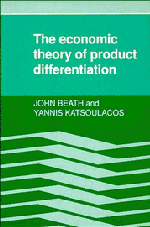Book contents
- Frontmatter
- Contents
- Preface
- 1 Introduction
- 2 Spatial models of imperfect competition
- 3 Symmetric preferences, the Chamberlinian paradigm
- 4 Product diversity and product selection: market equilibria and social optima
- 5 Product quality and market structure
- 6 Vertical product differentiation
- 7 Product differentiation and market imperfection: limit theorems
- 8 Product differentiation and the entry process
- 9 The gains from trade under product differentiation
- Notes
- Bibliography
- Indexes
9 - The gains from trade under product differentiation
Published online by Cambridge University Press: 03 May 2010
- Frontmatter
- Contents
- Preface
- 1 Introduction
- 2 Spatial models of imperfect competition
- 3 Symmetric preferences, the Chamberlinian paradigm
- 4 Product diversity and product selection: market equilibria and social optima
- 5 Product quality and market structure
- 6 Vertical product differentiation
- 7 Product differentiation and market imperfection: limit theorems
- 8 Product differentiation and the entry process
- 9 The gains from trade under product differentiation
- Notes
- Bibliography
- Indexes
Summary
Introduction
In addition to its impact on the economics of industrial organisation, the theory that we have looked at in the previous eight chapters has had important implications for international economics. Until recently, the theory of international trade has used either the perfect competition or the pure monopoly model. However, the last few years have seen efforts to base it on a model of imperfect competition. Thus a suitable way of closing this study of the economic theory of product differentiation seemed to be to use this last chapter to give the reader a flavour of this important and rapidly growing literature dealing with international trade under imperfect competition. This is not a book about international trade and so inevitably our treatment will be a little selective. However, what we shall endeavour to do is to highlight the different routes through which trade under product differentiation may increase potential social welfare. In other words, our concern will be to discuss the gains from trade rather than the positive theory of trade (the latter dealing with the volume, composition and pattern of trade), or the theory of trade policy. The reader who is interested in a thorough discussion of these other topics should refer to Helpman and Krugman (1985), Kierzkowski (1984) or, for a very useful informal survey, to Venables (1985).
There are a number of ways or mechanisms through which trade under imperfect competition may lead to an increase in welfare.
- Type
- Chapter
- Information
- The Economic Theory of Product Differentiation , pp. 173 - 183Publisher: Cambridge University PressPrint publication year: 1991



